How Ronald Reagan’s flexibility calmed political storms
- Experts say Reagan could have successfully operated in today's Republican Party
- Reagan blended toughness with a veneer of civility
- Reagan was instrumental in negotiating the end of the Cold War
(NewsNation) — Former President Ronald Reagan may be known best as The Great Communicator, but his role as the nation’s negotiator-in-chief allowed the country’s 40th president to successfully navigate a political climate that seems light years from the combative battlefield that now exists in Washington.
Reagan, who died 20 years ago on Wednesday, relied not only on his affable and congenial spirit to achieve his presidential agenda but on a willingness to build compromise into the formula. The combination created a recipe not only for popularity among the American public but for a lasting legacy of presidential productivity.
This Saturday, NewsNation will air the 90-minute documentary film “Reagan: Portrait of a Presidency” about the life and legacy of President Ronald Reagan, narrated by actor Dean Cain. The documentary film will air from 9-10:30 p.m. ET (8-9:30 p.m. CT), followed by “Reagan: The Post Show,” with NewsNation senior political contributor George Will and chief Washington anchor Leland Vittert from 10:30-11 p.m. ET (9:30-10 p.m. CT). To find NewsNation on your screen, go to JoinNNN.com.
Unlike today’s Washington, where animosity and divisiveness are the rules rather than the exceptions, Reagan’s presidency is viewed as one that saw past party loyalties to work toward the betterment of the greater good rather than for the advancement of partisan politics.
Talmage Boston, a historian, attorney, and the author of “How The Best Did It: Leadership Lessons From Our Top Presidents,” said that Reagan’s pitch across the political aisle was received favorably because of his reputation of acting like a gentleman.
That was not only true among Republicans, but also with Democrats like his chief rival, former U.S. House Speaker Tip O’Neill based on Reagan’s understanding that to get things done, he had to appeal as much to Democrats as much as he did to Republicans.
“The (political) atmosphere was just so conducive because of his leadership toward people working together as opposed to people wanting to do battle every single day,” Boston told NewsNation.
Ronald Reagan’s flexibility
A portion of Reagan’s appeal to his political opponents was borne out of compassion, Boston said.
Reagan had only been in office two months when he was shot by John Hinkley, Jr., who attempted to assassinate the president outside of Washington’s Hilton Hotel on March 30, 1981.
Civility led politicians from the country’s two major political parties to extend an outpouring of sympathy and concern toward Reagan. He recovered quickly, and the groundwork that he had laid through his gentle, but tough nature and a willingness to be flexible continued to serve him well during the remainder of his two-term presidency, Boston said.
“He was not inflexible,” Boston said. “He knew that to get what he wanted was going to require some compromise.”
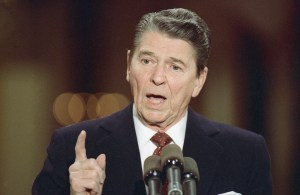
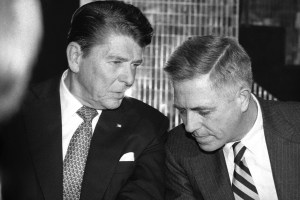
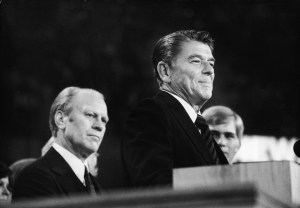
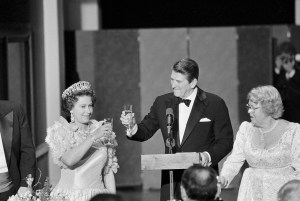
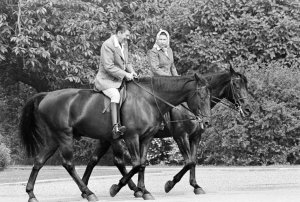
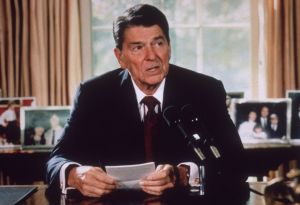

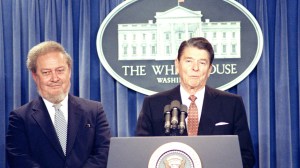
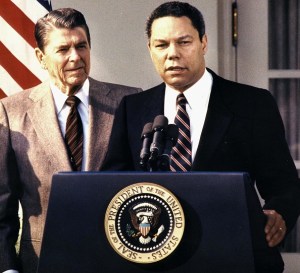
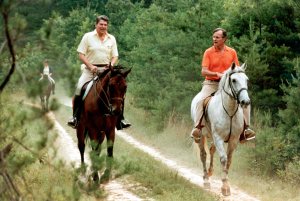
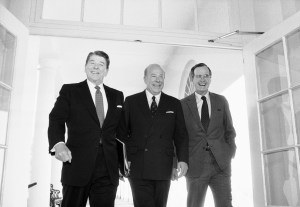
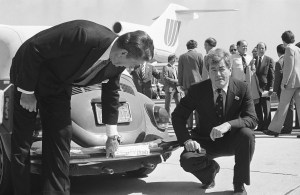
In that vein, Reagan routinely told his Chief of Staff James Baker that he “would rather get 80% of what he wanted than go over the cliff with his flag flying.”
Reagan’s reputation for acting with integrity and a willingness to bend helped to create a sense of unity – not only in Washington but around the country. Whereas the country currently remains heavily divided, particularly along political lines, Reagan’s ability to win people over without being seen as soft added to his presidential legacy.
Although two of his presidential successors, George H.W. Bush and Bill Clinton, showed a propensity to overcome political obstacles in the name of productiveness, Reagan’s success at creating a sense of togetherness placed him into a different category.
Dale Petroskey, who served as an assistant press secretary during Reagan’s second term, remembers arriving in the White House in 1985 when the president boasted a 75% approval rating among Americans.
Petroskey told NewsNation that the vast majority of those who disagreed with Reagan’s politics “had a very hard time not liking him personally.”
Much of that was design.
“Ronald Reagan understood the last thing people want is anger,” NewsNation political contributor George Will said. “Whenever you’re on television, whatever you’re doing, you’re doing it in stranger’s living rooms. And they’d like you to behave.”
Ronald Reagan, the negotiator
Reagan relied on that tactic to win over the American public and to help find common ground with his political opponents – even at times when it seemed like there was none, Will said. He did so, Will said, by blending a “veneer of civility” while following an axiom of American politics that if one wants people to like him, it helps to like people.
Reagan, who ran the Screen Actors Guild for seven years in Hollywood during his time as an actor, used the same negotiating skills to deal with both domestic and foreign issues.
Between working with former Soviet President Mikhail Gorbachev to end the Cold War to working with Democrats to solve the economic woes that faced the United States during the 1980s, Reagan followed similar scripts in working together to work toward a common goal, Will said.
After taking a hard stance on communism and Soviet governance early on in his presidency, Reagan’s ability to soften his approach once Gorbachev took power became part of his lasting legacy after following the lead of former British Prime Minister Margaret Thatcher, who saw an opening to work with Gorbachev toward resolving the Cold War.
Like other American leaders who found success and popularity during their time in the White House, Reagan blended political persuasion with personality to help calm the storms that have created so much animosity in Washington under recent presidential watches.
Two decades after his death, Will claims Reagan could have navigated today’s rough political waters as he did during his White House tenure while also finding his way in today’s Republican party. He would have done so, Will said, by giving voters a candidate willing to say, “Calm down; this is America, we are not enemies, we’re friends.”
“I think that ameliorative spirit was part of Reagan’s appeal, and he meant it,” Will told NewsNation. “He did not attack Democrats by name. He just didn’t. He knew that at the end of the day, he had to deal with them.”














